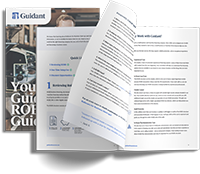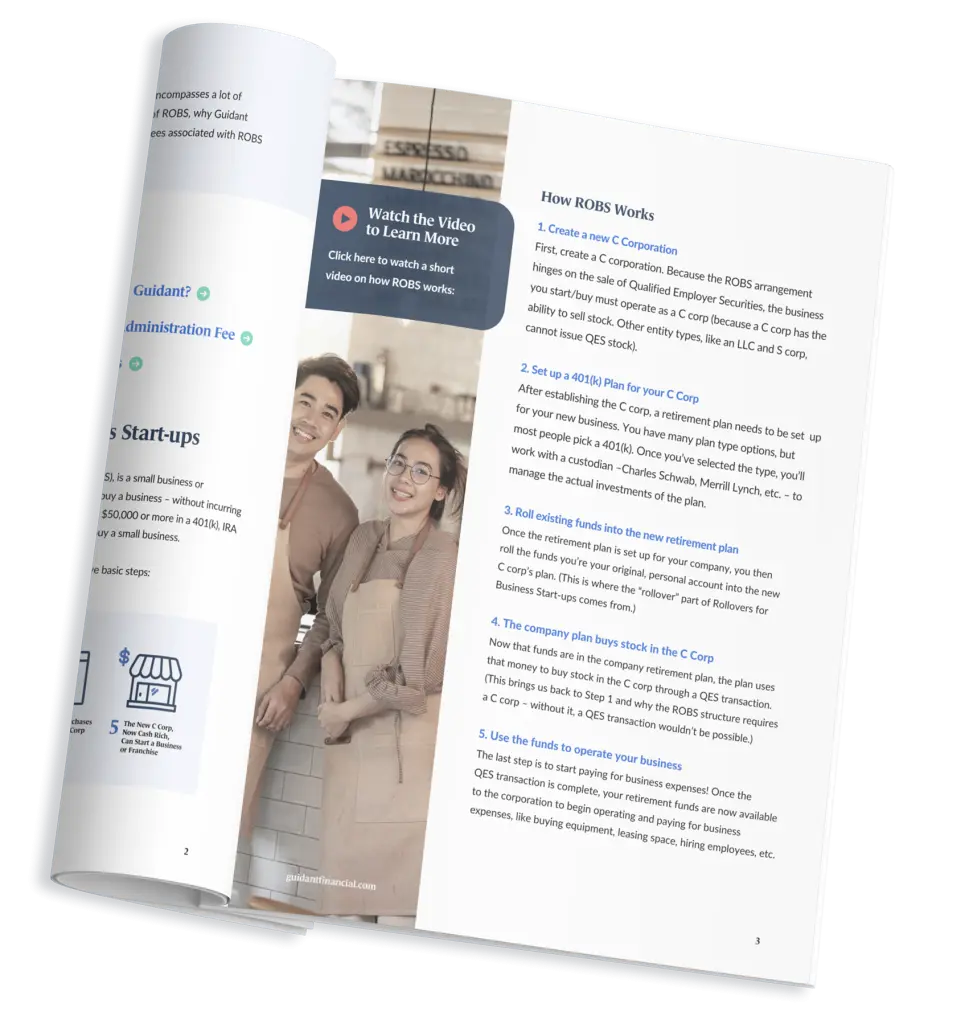If you’re considering becoming a small business owner, but aren’t sure where to start, don’t stress! There are easy steps you can take starting right now. Even if you don’t feel ready to make the leap, it may surprise you to learn that many successful business owners start planning over a year in advance. Here’s your timeline for opening a successful small business.
First Steps as a Future Business Owner
Whether you have an exact business idea in mind or not, there are a few things you can and should do before making major moves towards opening your small business. Even if you’re in the very early stages of becoming a business owner, you can start checking off these important to-dos.
Get Pre-Qualified
Pre-qualifying for small business financing is something that many aspiring small business owners skip because they don’t want to get locked into working with a certain company, or it seems like a time commitment. However, Guidant offers a free two-minute pre-qualification tool. It gives you a summary of all your financing options, your maximum funding amount, and requires zero commitment — it’s purely to help you start on your small business journey.
Understanding your funding options before at the beginning of starting your business is necessary; that information is crucial for making decisions along the way. Many people are pre-approved for more than they expected, which opens the doors to even more business opportunities. And some people aren’t as qualified as they assumed, which means they can take time to either save more for the down payment on a loan, take steps to improve their credit score or look at different funding avenues such as borrowing from friends and family.
Choose a Type of Business
Another early decision that will help steer your future business course is deciding whether you want to start an independent business or purchase an existing business or franchise. There’s no right or wrong answer, but each option has a host of different implications such as the total cost of the business and your responsibilities as an owner.
For example, franchises tend to have a higher upfront cost than independent businesses, because you can control the cost of a start-up by starting your business from home, waiting to purchase equipment, etc. However, with a franchise, you get the benefit of brand recognition and support from corporate headquarters.
The cost of purchasing an existing business can vary greatly depending on the state of the business and what kind of purchase you’re completing (you may just be purchasing the assets, vs. the location, etc.). However, if you do decide to purchase an existing business, it’s a good idea to add securing a business valuation to your timeline. A business valuation helps you understand the fair selling price of a business.
Write a Business Plan
It may seem early, but once you’ve determined what kind of business you’re going to forward with, it’s time to write a business plan. A business plan is a living document, so if you change your mind or something doesn’t go the way you thought it would, you can always make edits. Creating a business plan helps you stay on track as you work to open your doors, keeps you on a budget, and is a necessary step for most secured debt financing options such as SBA loans and Seller Financing.
6 to 12 Months Out
After you’ve figured out what type of business you want, and you understand how much small business financing you’re qualified for, it’s probably tempting to rush to open the doors to your new business. But even if it feels like you’re moving slow, it’s smart to lay a solid foundation necessary for a successful business. When you’re within a year of realistically launching your business or opening your doors, check these items off your list.
Move Forward with Financing
Pre-qualifying for business financing gave you insight into how much capital you have access to and what types of funding you likely qualify for. However, it didn’t put money in the bank, and some types of financing take several months to secure. Here’s an overview of how you should prepare for some common types of funding.
Small Business Association (SBA) Loans
SBA loans provide up to $5 million in funding for qualified small business owners. The SBA doesn’t fund loans directly; instead they provide backing for individual financial institutions in case the loan goes into default. This means that as the borrower, you need to work with individual banks and credit unions to qualify for a loan. Qualifying for an SBA loan can be a lengthy process, and each loan application is different. However, you can speed up the process by working with company that offers SBA loan packaging — which allows you to complete just one application that will go to multiple lenders, chosen based on how likely they are to provide you funding. Even if the application process goes smoothly, the process can take anywhere from two weeks to 90 days, so it’s important to get an early start.
Learn more about SBA loans with the Complete Guide to SBA Loans.
Rollovers for Business Start-ups (ROBS)
ROBS, also known as 401(k) business financing, allows you to use your retirement funds for small business financing in a tax-penalty free transaction. Even though completing ROBS funding can be done in as little as one week, many retirement plans have a rule that you can’t roll money out of the plan if you’re still actively employed. In other words, if you want to use the money in an employer account for ROBS funding, you’ll need to leave your job. For most people this isn’t an issue because the new business is about to become their full-time job. But if you plan to continue working to save up money before opening shop, you need to leave time to complete the rollover.
Learn more about Rollovers for Business Start-ups with the Complete Guide to 401(k) Business Financing.
Money from Friends, Family, and Investors
Raising business capital from people you know, investors, or through crowdfunding takes time. There is a lot to prepare: people will want to see your business plan, details about your product or service, estimates of money needed, etc. Getting the word out is slow — and lots of people say no. Raising business capital can be done, but start early because it won’t happen overnight.
Secure Real Estate
If your business requires a brick-and-mortar location, it can be very helpful to start the search for real estate early. Whether you’re renting or buying, finding the right location at the right price is rarely a quick process. This is especially true if you’re finding real estate for a franchise — franchises typically have specific requirements that need to be met. Working with a real estate agent (or an attorney) can be beneficial to ensure any location you commit to can be altered to meet those requirements.
Filing Business Licenses
Depending on the products and services offered by your business, acquiring a business license can take longer than many expect it to. This is especially true in industries like food and beverage and professional services such as legal, tax preparation, and medical offices. Also, if you haven’t already done so, this is a good time to file incorporation paperwork for your business. Keep in mind; it’s best to know what type of financing you plan to utilize first, as this can have an impact on your business structure.
Less Than 6 Months Out
After the major milestones like finding a location for your business and getting your paperwork and federal filings in order, you can start to build your team and promote your business. Here are steps to take when you’re just a few months or less from officially launching your business.
Build Your Team
According to recent data from the State of Small Business survey, about 33 percent of small business owners are their only employee. So if a large multi-person team isn’t in your plans, don’t worry! There are plenty of people finding success with just a few employees. However, whether you’re hiring staff or outsourcing tasks, you should start figuring out who you’re going to work with for key tasks like legal support, tax filings, or creative services.
Set Up Business Services
There’s a misconception that business services software such as payroll and bookkeeping programs should be purchased once your business is already operating. But in reality, having the right tools in place to manage your business is critical from day one. Even if you are your only employee, it’s important that paychecks be deposited on time and that taxes are appropriately allocated. Paying late or in the incorrect amounts can result in hefty IRS or DOL fines for your business.
Digital financial recording keeping programs such as QuickBooks, make it easy to manage your bookkeeping. As a bonus, it’s simple for someone like a CPA, to access your data for tax preparation. If you’re paying someone by the hour to prepare your taxes, this can save you big at the end of the year.
Create an Online Presence
One of the last steps to take before opening your doors is to create an online presence. As you spread the word about your products or services, it’s important to direct people your website, social media accounts, etc. This visibility helps to build brand recognition, excitement about what’s to come, and initial trust in your customers. No matter what your product or service is, customers need to be able to find you online to want to do business with you.
If you’re not sure where to start, sign your business up for Google My Business (GMB). It’s a free service offered by Google that makes it much easier for customers to find your contact information, physical location, and leave online reviews. Make sure to fill out as much information as possible, because Google pulls information from GMB for people who are searching for information on local services.
Get Started Today
It might be intimidating to see that starting the business of your dreams can take over a year of preparation before you even open your doors, but time flies in the life of a small business owner. So, if you’re excited about the idea of becoming your own boss, there’s no reason to wait — start checking off the to-dos today.


















